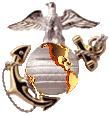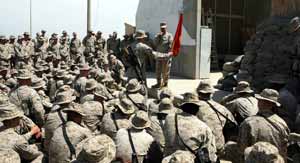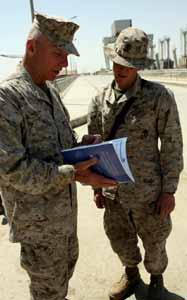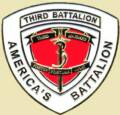In war-torn Al Anbar, Marines, Iraqi soldiers keep city streets safe
Submitted by: Regimental Combat Team7
Story by: Computed Name: Sgt. Roe F. Seigle
HADITHA, Iraq (April 12, 2006) -- The windswept streets of Haditha are lined with stores and houses pocked with bullet holes that tell a story of a community once plagued by fear from insurgents and terrorists.
Now, those stories are fading memories and new memories are being formed. The buildings in the city of approximately 30,000 are being rebuilt and children are free to play safely in the streets guarded by United States Marines.
“The Marines are our friends and have been a gift from God,” said “Josem," in French, which he learned while studying at a university in France. Josem has seen first-hand the damage insurgents can do to a family’s life. He lost his brother in an explosion caused by insurgents in Haditha.
“They (Marines) have made life here much more peaceful for us since they arrived last year,” he said.
Sgt. Jody Stroud, 28, a machinegun section leader assigned to the Hawaii-based 3rd Battalion, 3rd Marine Regiment, strongly believes in the mission he and his Marines are accomplishing everyday in Haditha. Known as “three-three” for short, the battalion provides security to the thousands of Iraqis who live in this region along the Euphrates River in western Al Anbar Province.
“We (the Marines and Coalition Forces) gave our word to the Iraqi people that we would free them from insurgency and help them build a new government,” Stroud said as he washed his camouflage utilities in a mop bucket in India Company’s forward operating base in the heart of Haditha. During moments like this, Stroud thinks about his father who served in the battle of Iwo Jima and received a Purple Heart for injuries he received in the Korean War while wearing a Marine Corps uniform.
“My dad would never talk about the wars he served in,” said Stroud. “All I remember him telling me is there are two ribbons I do not want you to have to earn; those are the Purple Heart for injuries and the Combat Action Ribbon.”
Now Stroud is in a situation where both of those ribbons can be earned, he said.
A hotbed of insurgent activity less than a year ago, Haditha’s streets are now patrolled daily by the Marines and Iraqi soldiers to maintain order and disrupt would-be insurgent attacks. The constant presence, along with several key counterinsurgency operations last year to quell insurgents’ ability to run amuck here, has helped calm the region in recent months. Now, it is bustling with Marines and Iraqi soldiers that serve side-by-side with the Marines from India Company as they learn the tactics and techniques necessary to conduct operations on their own.
“The American people need to know that they are not seeing the whole story on TV,” said Stroud. “They do not see the schools being built and a new and fair government being established.”
Stroud, a native of Annapolis, Md., says the Marines are treated with hospitality by the citizens of Haditha, which in turn leads to trust between troops and the Iraqis.
In Haditha, India Company Marines have been patrolling the streets daily with the Iraqi soldiers, and say the uniformed Iraqis are becoming more proficient with operating on their own. The Marines’ mission is two-fold in the Al Anbar Province – protect the Iraqi people by suppressing any remaining insurgents and continue to build the capabilities of the Iraqi Army unit here to eventually relieve Coalition Forces in this area.
Still, this city in Al Anbar Province bordering one of the country’s larger lakes, remains a combat zone. Frequent reminders plague the Marines and Iraqi soldiers in the form of improvised explosive devices and small-arms fire attacks.
The remaining insurgents in Haditha test the Hawaii-based Marines’ tactics and responses to attacks, cited by at least one Marine officer here as to why Coalition Forces have seen a slight increase in attacks recently.
“They want to test us and see if we will over-react,” said Capt. Andy Lynch, one of the Marines’ company commanders here.
The battalion arrived in Iraq about a month ago.
Most recently, insurgents ambushed Marines near a high school here in a drive-by style shooting. Though no one was injured, Marines or civilians, Marine leaders here say the act was typical of insurgents.
Lynch believes the insurgents attacked the Marines in front of the high school in hopes the Marines would fire indiscriminately and injure non-combatants. The 30-year-old from Chicago has commanded India Company since June of last year, and is serving his second tour in Iraq. In his opinion, the Marines used “discipline and good judgment” when they returned fire on the insurgents – they avoided civilian casualties by thinking before pulling the trigger and returning fire, he said.
The recent attacks and ambushes against the Marines are also ways for the insurgents to probe the Marines’ tactics and techniques – a way to test the waters of the new unit, who arrived in Iraq last month, said Lynch. .
In another incident, insurgents ambushed a Marine patrol with small-arms fire – AK-47s, pistols and other weapons. Though one Marine was injured, he was treated and “back in the fight” within hours, a sign to insurgents that “three-three” will not be deterred by the insurgents’ attacks, according to the Marines here.
“The attacks against India Company really do not have any effect on the Marines,” said 1st Sgt. Chuong Nguyen, India Company’s senior enlisted advisor and 12-year Marine Corps veteran.
“The Marines are going to fight back,” said Nguyen, a native of Santa Ana, Calif. “When they go out on patrol, they are taking … Iraqi soldiers out with each squad and they (Iraqi Soldiers) are learning all the tricks the insurgents try to pull as well.”
Nguyen, who served in Afghanistan with the unit last year, says his Marines are well aware of the dangers they face everyday in the area, but are still pressing hard to stop the remainder of the insurgency by maintaining a consistent presence in local communities.
“The Marines are giving their max effort everyday and are quickly learning how the insurgents are operating,” said Nguyen, who added that the Marines’ and Iraqi soldiers’ vigilance are key to keeping insurgents at bay.
During patrols through this town of 30,000, Marines and their counterparts in the Iraqi Army are welcomed into homes of citizens and are told of atrocities committed by insurgents. Offered tea, food, sometimes even cigarettes, the Marines kindly thank the Iraqis for their hospitality, but decline the invitations.
Instead, the Marines seem more interested in assessing the town’s security environment by seeing what locals have to say about insurgent activity, and to find out if insurgents are intimidating the local populace.
Back inside their fortified base, the Marines try to put the day’s work behind them, and take a few hours to sleep, eat and chat about home life before going “outside the wire” again.
Though they are half a world away from their loved ones, the Marines have plenty of amenities here to help make life a little easier during the deployment, said Lynch.
“Things like the gym and the cable TV take the sting out of the physical discomforts of hours of patrolling,” said Lynch. “All the Marines are going through it (deployment) together and they have their brothers right there with them.”
Lynch’s calm demeanor turns a little more serious as conversation turns from talks about the creature comforts on the Marines’ base to talks about the insurgency in the region. The insurgents, he said, have no chance of success against “a company of well-trained infantry Marines.”
For the remainder of their deployment, the Marines from India Company say they look forward to making history here by helping Iraq develop a well-trained police force and military capable of maintaining law and order on their own.
These Marines see the progress their Iraqi counterparts are making every day, and say they want the rest of the world to know it, too.
“There is still a threat out here and we are going to eliminate it,” said Stroud. “We gave our word to these people to help them and this is what we are going to (do). We have to keep our word.”
Source: Marine Corps News

Note: This is not an official website. It's purpose is to support Marines of 3/3.

Corps’ top officer says Marines, sailors are winning the war on terror
Submitted by: 1st Marine Division
Story Identification #: 2006413133532
Story by Sgt. Roe F. Seigle
HADITHA, Iraq (April 10, 2006) -- The Marine Corps’ top officer recently stated he was confident Coalition Forces were going to win the Global War on Terrorism.
During a visit to Marine units throughout the Al Anbar Province of Iraq April 10, the Commandant of the Marine Corps, Gen. Michael W. Hagee, told Marines and Sailors of the Hawaii-based 3rd Battalion, 3rd Marine Regiment, or “America’s Battalion”, that they “stepped up to the plate when their country needed them most.”
“I have never seen a better Marine Corps than I have today,” said Hagee, to the Marines and sailors on the top of the Haditha Dam, overlooking the Euphrates River. “You always accomplish the mission you are tasked with.”
During the visit, Hagee entertained Marines’ questions on a number of topics, to include the future of the Marine Corps and new guidance on earning the combat action ribbon.
Hagee was accompanied by the Corps’ senior enlisted advisor, Sgt. Maj. John L. Estrada, Sergeant Major of the Marine Corps, during the three-day tour throughout Iraq’s Al Anbar Province.
Per the General’s new guidance in a message to all Marines last month, Marines and sailors are eligible for the combat action ribbon if they are in a vehicle convoy that is struck with an improvised explosive device and they “take appropriate action during the detonation of an improvised explosive device.”
A recent debate regarding the combat action ribbon was sparked after thousands of Marines and sailors were denied the ribbon even though they were exposed to the roadside bombs, commonly referred to as “IEDs,” during combat operations.
Now, Marines and sailors who encountered IEDs in the past who may now be eligible can be submitted for consideration for the award. In the past, the award was given to those only involved in combat involving the exchange of gun fire.
“Either you initiate contact with the enemy or the enemy initiates contact with you, and you react properly,” said Hagee, speaking to hundreds of Marines and sailors. “Some Marines believe contact has to be initiated by rifle fire and you have to return rifle fire and that is not true.”
Hagee also spoke of a possible reduction of Marine battalions in Iraq as the Iraqi government continues to stabilize. A year ago, nine Marine battalions were deployed to Iraq, he said. Now, there are only six, due in large part to the progress Iraqi Security Forces have made and the combined efforts Coalition Forces have made to keep Iraq moving towards self- independence.
In Al Anbar Province, I Marine Expeditionary Force units are partnered with Iraqi Army units to conduct counterinsurgency and humanitarian-type operations in the volatile area. The Marines and sailors of “America’s Battalion” have spent more than a month now conducting joint operations to rid the area of insurgents.
Furthermore, the battalion’s Military Transition Team is advising and mentoring Iraqi soldiers in the region as they progress towards fully independent operations, which Coalition Forces say the Iraqi military will be ready for by year’s end.
“This is a tough fight and you are the center of it,” said Hagee to the Marines, referring to the progress they have made battling the insurgency.
Before departing, Hagee ended his visit by handing out several personalized “coins” to several of the battalion’s Marines and sailors who have made significant achievements during their deployment since the battalion arrived here last month. The general also took time to pose for photos with the Marines and sailors.
“It is an uplifting experience to see the Marine Corps’ senior advisors because it gives a chance for individual Marines to talk to him face-to-face about issues pertaining to the Marine Corps and the Marines lives,” said Cpl. Rory Chapin, a 27-year-old intelligence analyst from Waldwick, N.J. “Marines deserved to be recognized for their accomplishments when they are out here in the fight.”
The battalion is part of the I MEF, a force of 23,000-plus Marines and sailors deployed to Iraq’s Al Anbar Province. The Marines will return to their base in Hawaii in early fall.
_________________________________________________________________
Photos included with story: The Commandant of the Marine Corps, Gen. Michael W. Hagee speaks with Marines and sailors of the Hawaii-based 3rd Battalion, 3rd Marine Regiment at their forward operating base at Haditha Dam during a round-robin visit to Marine bases throughout western Al Anbar Province, Iraq, April 10, 2006. During his three-day tour around Al Anbar Province, Hagee told Marines and sailors that he is confident Coalition Forces were going to win the Global War on Terrorism, telling them that they “stepped up to the plate when their country needed them most.” Accompanied by the Corps’ top enlisted person, Sgt. Maj. John L. Estrada, Hagee discusses a variety of topics with Marines and sailors, to include new guidelines regarding the awarding of the Combat Action Ribbon and the continuing progress of Iraqi Security Forces. Photo by: Sgt. Roe F. Seigle
--------------------------------------------------------------------------------
Sgt. Maj. John L. Estrada, Hagee discusses a variety of topics with Marines and sailors, to include new guidelines regarding the awarding of the Combat Action Ribbon and the continuing progress of Iraqi Security Forces. Photo by: Sgt. Roe F. Seigle
Source: Marine Corps News


Making good on a promise, the Commandant of the Marine Corps Gen. Michael W. Hagee gives a book autographed by various Medal of Honor recipients to Pfc. Edward Romig, of the Hawaii- based 3rd Battalion, 3rd Marine Regiment at the Marines’ forward operating base at Haditha Dam during a round-robin visit to Marine bases throughout western Al Anbar Province, Iraq, April 10, 2006. The Corps’ top leader met Romig’s father at a fundraiser, where Romig’s father donated money to support troops overseas. Hagee told Romig’s father he would deliver the book to him when he saw him in Iraq. During his three-day tour around Al Anbar Province, Hagee told Marines and sailors that he is
confident Coalition Forces were going to win the Global War on Terrorism, telling them that they “stepped up to the plate when their country needed them most.” Accompanied by the Corps’ top enlisted person,
